|
|
 

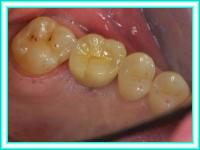
|
Dental Implant Placement |
|
Excellent aesthetics and function of the molar definitively rehabilitated.
Osteointegrated implants of a straumann implant with sla active surface after implantation combined with guided bone regeneration procedure. Consulting aesthetics of dentistry clinic to clinic placement aesthetics.
Replacement of a fractured molar by a straumann dental implant with sla active surface, wide neck standard plus type, with a dimension of 4.8mm x 10mm.
Previous bone filling.
After the required 6 months period.
|
|
|

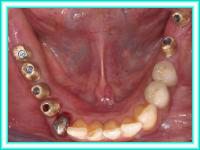
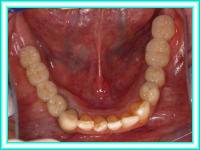
|
Dental Implants and Aesthetics |
|
|
An exemplary case, restored with aesthetical and functional porcelain crowns.
- They enable good oral hygiene.
- Ensure good durability.
- A hygiene control is required every 6 months or one year.
Jaw case.
- Restored with dental implants next to natural teeth.
- Formerly, only movable prosthesis could solve the case.
- A restoration of the fractured tooth is performed to avoid a dental root extraction, placing a pillar, and then the tooth is rehabilitated.
- Straumann dental implants placed with sla surface treatment system, ready to place abutment to achieve passivity and parallelism.
- Calcinable system was used.
|
|
 |
Dental Implants |
|
Approximately 4 million patients bearing this problem have been treated with dental implants. As compared to these, about 48 million patients have received conventional treatment.
It is considered that over 240 million people have lost one or more teeth (USA, Europe and Japan).
|
|

|
New Zygoma Implants |
|
Zygomatic Implants
Zygomatic implant development present a unique alternative for the complete rehabilitation of the atrophic jaw (upper jaw), by means of only one surgical step and with no need of a graft.
|
This long implant is anchored on the upper jaw and inside the zigomatic bone. A provisional prosthesis can be fixed immediately after placing dental implants, until complete restoration is achieved according to the patient’s wishes and aesthetical criterion. The main advantages of zygomatic implants over sinus floor elevation procedure are the duration of treatment and success rate, which is of 100% after 5 years, according to scientific research. If you are not satisfied with your removable upper prosthesis, it is worth to consider this option, because zygomatic dental implants will give you the chance to recover the biomechanics of your original
denture.
New zygoma dental implants for a beautiful smile are the only choice for patients bearing poor jaw anchorage.
Are you not having enough volume for dental implants?
The ideal candidate for a dental implant has good general and mouth health. Jaws need an adequate amount of bone to support dental implants and best candidates have healthy gums.
The region of the upper and back jaw is traditionally one of the most difficult areas to place a dental implant, due to lack of bone quality and quantity and the proximity of the maxillary sinus. If bone mass is lacking in this area due to a periodontal illness or tooth loss, there might not be enough amount of bone to obtain enough anchorage for dental implants. This situation can be corrected increasing maxillary sinus or by means of zygomatic implants.
Sinus Floor Elevation or Sinus Lifting
The purpose for this procedure is to elevate sinus floor and recreate the bone for dental implant placement. There are different techniques to elevate the sinus and allow new bone growth.
According to individual needs, there is normally a period of 4 to 12 months before placing dental implants. After its collocation, an additional period is required for scarring. In some cases, implant can be placed at the same time of sinus augmentation.
That treatment could be most adequate in the case of a patient who has lost one or more teeth and a considerable amount of bone mass.
|
|
 |
What are they? |
|
|
Dental implants are artificial substitutes for natural teeth roots that are placed inside the bone to replace absent teeth roots. Artificial teeth (prosthesis) are then fixed on these new roots. The aim of dental implants is that those people with one or more missing teeth are able to masticate, speak and smile normally.
|
|
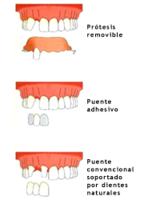

|
Advantages |
|
It should be mentioned that conventional fixed prosthesis (bridge) require the carving of neighboring teeth (pillars) and that partial removable prosthesis (skeletal) cause damage to support teeth with their attachments. Complete removable prosthesis reabsorbs the jawbone and loose stability after some time.
- Conventional solutions for the loss of one tooth.
- Use of an endo osseous implant as a substitute for one lost tooth
- Conventional solutions to substitute many lost teeth
- Use of many endo osseous implants to replace many lost teeth
- Classic solution for the loss of all teeth on one jaw (completely toothless)
- Use of dental implants for a fixed prosthesis placement on a completely toothless jaw (over denture or implant-supported prosthesis).
|
- They improve appearance: each tooth consists of a crown and a root. There are different methods to substitute the crown, but only the implant enables to substitute the root, thus the jaw bone does not loose volume and the face shows a more youthful look.
- They enable patients to eat anything: even in cases of excellent fixing, people with artificial dentures cannot eat anything they want, nor with the same comfort as of natural teeth, which can be achieved through dental implants.
- They improve comfort and speech: teeth fixed on dental implants seem, function and appear as natural, thus not presenting the discomfort of artificial dentures while speaking and they do not move.
- They have a lasting result: Dental implants are a long-time solution that may last for life, while traditional treatment for artificial rootless dentures must be repeated from time to time.
|
|

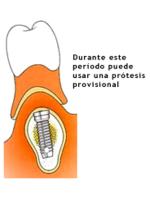

|
How are implants placed? |
|
|
If the patient has little maxillary bone, preventing dental implant placement, there are several therapeutical options:
- Bone grafts (normally from the patient himself).
- Osteogenic distraction.
- Maxillary sinus elevation (rear sector of upper maxilla).
- Guided osseous regeneration.
- Cigomatic implants, etc.
- Implant placement.
- Scarring period (upper maxilla 4 to 6 months, jaw 2 to 4 months).
- Scarring pillars placement.
- Permanent teeth fixing on pillars.
First surgery: In the first place, after studying and planning your case, and taking the necessary diagnose tests (x-rays, etc.), the surgeon places the number of implants required in the jaw bone, inside the gum. In order to avoid discomfort, intravenous sedation and anesthesia is administered, normally loco regional. On the next day, the patient can go back to his normal activities. Then, he should wait until the implant binds to the bone (osseous integration), a process that may last some weeks to several months, depending on the case. During that time, he can wear provisional crowns, bridges or
dentures.
Second surgery: Once scarring process is complete, pillar or support is connected to each implant, again with loco regional anesthesia and after opening the gum in order to have access to dental implants. The pillar is the intermediate device to which the teeth will be fixed later on. After pillar placement, these are covered with a protective layer or dressing that will help gum scarring and diminish discomfort.
Days after fixing dental implants, the dressing can be taken out. The specialist will take an impression of the present situation of the mouth to be able to carry out the design of the crown, bridge or complete denture. Finally, he will fix permanent teeth over the pillars.
|
This is a conventional technique (in two phases), but there are other possibilities, according to the individual qualities of each patient:
- Immediate implant: tooth extraction is performed and at the same time, dental implant placement.
- Dental implants of immediate loading: dental implants and prosthesis are placed on the same day.
|
|

|
Which discomfort might result from treatment? |
|
|
After treatment, some patients feel a discomfort similar to the one experienced after tooth extraction. There can also be gum, lip or tongue swelling. Dental implant placement is painless, because it is performed under loco regional anesthesia with conscious intravenous sedation.
|
|


|
What do I need to have a dental implant? |
|
|
None on the following should take place:
- Weakening non-controlled illnesses (diabetes, leukemia, hyperparathyroidism, etc.)
- Pregnancy
- Psychiatric or emotional disorders (chronical depression, personality changes, etc.)
- Intake of drugs altering bone metabolism (bios phonates)
- Lack of motivation to continue with treatment
- Lack of muscle coordination to carry out oral hygiene.
Clinical experience and research demonstrate that in order to have a dental implant with the greatest guaranties, the following requirements are necessary:
- That the maxillary bone is healthy and of the adequate size.
- That the gums do not have any swelling (periodontal illness – pyorrhea)
- That a good mouth hygiene is kept after the implant is placed, with regular visits every 2 to 6 months.
- That irritative factors are eliminated, such as smoking.
|
|
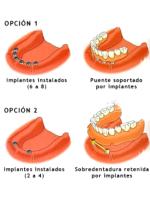 |
Which are the results? |
|
If the patient does not present unfavorable factors (smoking, drinking, etc.), follows the specialist’s advice and keeps periodical controls every 2 to 6 months, rate success for dental implants is of
-
95 – 98% in jaw
-
91 – 95 % in upper maxilla
From an aesthetical point of view, dental implants have a natural aspect and they are hardly recognizable from normal teeth. As to comfort and function, after a short adjustment period, with dental implants you can chew as with natural teeth.
|
|
 |
How do I know if I am a good candidate? |
|
Age is generally not an obstacle to follow a dental implant treatment, though in come cases adolescents and very elderly people cannot be good candidates. As a general rule, implants can be a good solution to:
- People with oral-facial defects due to lesions, traumatisms, surgeries or congenital defects.
- People having one, many or all teeth missing from the upper maxilla, jaw or both.
- People suffering from discomfort while wearing an artificial denture (friction, nausea).
|
|

info@paginas-de.com.ar
|


